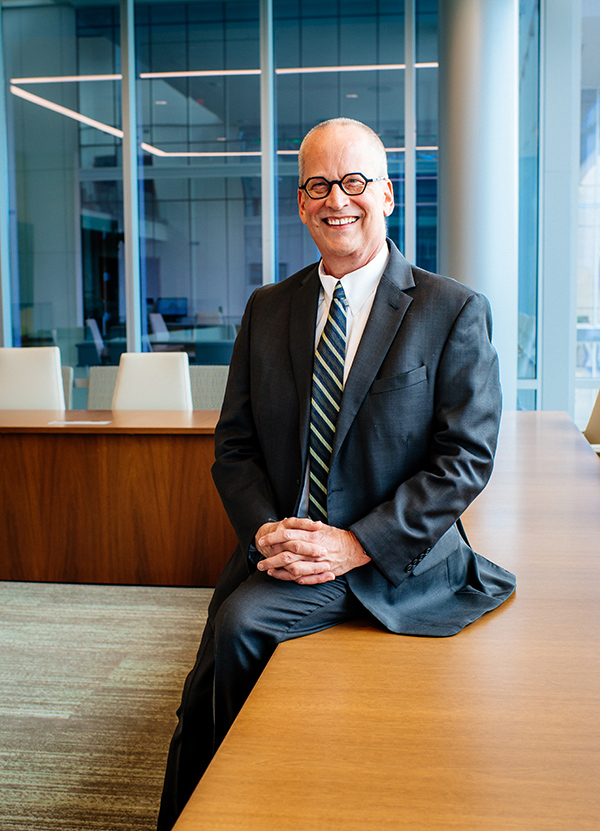A phrase on the UAB Collat School of Business website caught new Dean Christopher Shook’s attention the first time he saw it.
Transforming lives one student at a time.
“That’s our business and we should never forget it,” says Shook, who took over as the school’s seventh dean on July 1. “What other job do you get to do where you really change somebody’s life?”
A former dean at Western Kentucky University and the University of Montana, former chair of the management department at Auburn University and former director of the Lowder Center for Family Business and Entrepreneurship at Auburn, Shook brings a wealth of experience to his new role.
And a deeply personal perspective on how education impacts the trajectory of generations.
“I’ve seen firsthand what education did for me,” he says, “and that had a follow-on effect for both my girls, and it will with my grandchildren. Education changes people’s lives.”
Growing up in rural northeast Colorado, Shook saw early on that education could improve a person’s situation in life.
“Growing up with four siblings, there was not a lot of extra money,” he says. “I knew I didn’t want a rural Colorado life,” he says. “That life is hard. I just always wanted more.”
FUN FACTS: Shook has walked the Camino de Santiago twice, the first time traveling the Portuguese Way and the second time taking the longer French Way. He’s also a former Fulbright Scholar.
Education offered another life. Shook started off in general business at Northeastern Junior College in Sterling, Colorado, then changed his major to accounting to garner a much-needed scholarship. He transferred to Northern Colorado University, graduated with a degree in accounting and settled in to audit work at a regional accounting firm in Colorado.
But it didn’t last long. He found the work repetitive and, again, wanted more.
Shook jumped at the opportunity to study for an MBA when the University of Mississippi offered him a scholarship. Afterward, he worked at the Federal Reserve Bank of Oklahoma City, but the thought of more education kept gnawing at him. He moved to LSU to pursue a Ph.D. on fellowship.
“Learning is the only thing I never got bored with,” he says. “I mean, no matter what job I had, once I learned it, I would just get bored. But with a Ph.D., I found that if I got tired of researching one topic, I could research another one. There’s always something new.”
Shook’s research focuses on three main areas: entrepreneurship, research methodology, and strategic management.
“The most interesting to me is trying to understand why people do what they do,” he says. “My Fulbright research project in Romania involved trying to understand why people became entrepreneurs in a post-communist society when they had never observed entrepreneurs before.”
Why is research important? Shook believes it is a critical component of effective teaching.
“It enhances your teaching if you’ve done the research on the topic, and you can talk about it,” he says. “How can we expect our students to learn if we quit learning?”
Shook would like to bring more research into Collat’s classrooms and create a culture in which faculty are able to translate their research to students and to the business community.
“Ideally there would be synergy amongst the research topics we pursue and the business community, that is getting companies here in town to let faculty in to do research,” he says. “Then we bring those companies back into the classroom. Guest speakers are effective as long as they’re tied into what you’re doing. I’m a big believer in applied learning instead of students just regurgitating information.”
He also wants Collat to remain a student-focused institution intent on making a difference in students’ lives.
“The clothes closet is a big, big deal to me,” he says, reflecting on his own college experience. “I remember that I went to my first interview with one of the, at that time, Big Eight accounting firms. I didn’t have appropriate clothes to wear so I didn’t get the job. It’s hard to feel confident if you’re not dressed appropriately. We need to be able to help students present their best selves.”
That will also mean examining the undergraduate and graduate curricula to ensure they meet industry needs and are teaching students the skills needed in a modern business environment. For instance, Shook says, the school may want to focus more on certificates than on minors.
“We found in talking to industry that businesses don’t really value the minor anymore in hiring; they want certificates,” he says. “We need to do some research here in town, but that was the feedback we received at Western [Kentucky University]. Certificates are much more specific about the competencies that are gained whereas minors are more classes. And we probably already have the classes we can put into certificates.”
It's one way he wants to make a difference at Collat and in Birmingham.
“Education changes lives,” he says. “Studies show that over a lifetime, the average earnings difference between someone with a college degree and someone without is estimated at $1 million. The return is there. It’s just a matter of getting people to look at the investment.”

